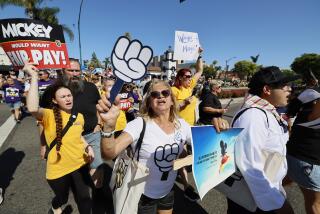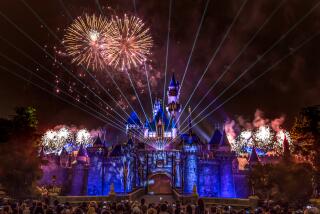Challenging Casting Call for Disney : HELP WANTED: Native American Indian, French-speaker preferred, to play Sitting Bull in Wild West show. Must be willing to travel to fight cowboys in suburban Paris. Generous European wage-benefit package. Apply Euro-Disney before 1992.
- Share via
NOISY-LE-GRAND, France — With the opening of Walt Disney Co.’s latest amusement park venture, Euro-Disneyland, set for next spring, the hunt is on for the 10,000 employees needed to staff the $4.4-billion entertainment complex emerging from the former beet fields 20 miles east of Paris.
Disney executives feel that a few jobs, such as Sitting Bull and Buffalo Bill in the Wild West dinner theater act, should be filled by Americans. The French government agrees, waiving its tough rules about non-European labor for these special cases. A Disney recruiting team is currently interviewing candidates in the United States.
But there are bigger challenges: to hire the thousands of mostly French “cast members” who, among other things, will be expected to work even during the sacred European holiday month of August; and to break them of their ancient cultural aversions to smiling at, and being consistently polite to, strangers.
When the idea of a Disneyland in France was first broached more than a decade ago, one of the main uncertainties was whether the rebellious, individualistic French could be molded into the squeaky-clean image of the Disney ideal. Rival theme parks in the area, loosely modeled on the Disney system, have had trouble keeping smiles on the faces of their staff, who sometimes took on the demeanor of subway ticket clerks.
Setting up its “casting center” on the ground floor of a high-rise office building in this eastern Paris suburb, Disney began its hiring push in September after an extensive ad campaign. Smaller recruiting offices were also established in London, Amsterdam and Frankfurt.
Euro-Disney personnel director Thor Degelmann, a native of Glendale, Calif., who started with the company 27 years ago as a pilot on the Jungle Cruise ride in the original Disneyland, said that so far, recruiting is on schedule.
“We’ve had 24,000 people show up looking for jobs, and we’ve hired 2,400. Everything is exactly according to plan,” Degelmann said. “A lot of people made assumptions about France and Europe that have not turned out to be true. We find that we are attracting the same kind of people we did in the U.S.”
A big advantage, Degelmann said, has been the new park’s ability to draw candidates from all 12 countries in the European Community, representing a pool of more than 350 million people. He added that a surprising number of French and other European candidates are happy with the Disney work ethic.
“If you go across the street to the shopping center,” he said, pointing to a multistory mall built over the Noisy-Le-Grand suburban railway station, “you will hear our own French cast members make comments about how unfriendly the service is in the cafes and stores.”
Among the young in France, where shopping malls and fast-food restaurants are proliferating at a phenomenal rate, the American cultural model is a powerful attraction.
“I worked for three years at McDonald’s,” a Disney job candidate told an interviewer with the Paris-based Liberation newspaper. “I like the atmosphere of these (American) companies. You know where things go, and you can easily assume responsibility.”
Disney has taken some ribbing from the French press over the image demanded by Disney talent scouts. For example, a video for potential employees reminds them to shower at least once a day. This runs counter to French traditions: According to Francoscopie, the annually published statistical analysis of French life, only 19% of French men and 32% of French women take a daily bath or shower.
More to Read
Inside the business of entertainment
The Wide Shot brings you news, analysis and insights on everything from streaming wars to production — and what it all means for the future.
You may occasionally receive promotional content from the Los Angeles Times.










